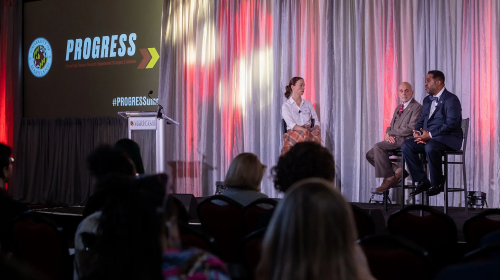See below article for more information. Photo by John T. Consoli.
In Baltimore, the number of young people who’ve been shot this year is up fourfold in a decade. Homicides in Washington, D.C. have spiked 33% in a year. The nation is again on pace to exceed 650 mass shootings.
Those chilling statistics underscore the urgency of a new University of Maryland Initiative: PROGRESS (Prevent Gun Violence: Research, Empowerment, Strategies and Solutions) will study gun violence, offer educational programming across the state on gun safety and issue policy recommendations on reducing shootings.
The enterprise was announced on Wednesday in an event featuring co-leaders Joseph Richardson, the MPower professor of African American studies, medical anthropology and epidemiology, and Dr. Woodie Kessel, professor of the practice of family science.
“Gun violence is a disease for which we know, ultimately, we will have a cure,” said Richardson.
The project will address a range of topics related to gun violence, including suicide, domestic violence, safe gun storage, gun trafficking and the influence of social media on violent behavior. The initiative will collect and analyze data, offer a speaker series featuring scholars and legislators, and engage community members to create actionable solutions for gun violence.
Richardson and Kessel have both made gun violence a centerpiece of their research. Richardson has pioneered hospital-based violence intervention, in which he works with victims of shootings brought into Maryland emergency rooms to encourage them to become advocates against gun violence. Kessel, a pediatrician, has long been focused on common sense measures to prevent deaths or injuries, ranging from helmet use to seat belts to childproof caps on medicine bottles.
The two have collaborated before: Richardson wrote a chapter in and Kessel edited the 2021 book “Why We Are Losing the War on Gun Violence in the U.S.”
Kessel, a former U.S. assistant surgeon general, noted that while physicians may have little recourse in rooting out childhood diseases like cancer, gun violence is preventable. “You can feel the pain in a community when violence is there and shouldn’t be,” Kessel said.
Wednesday’s event featured UMD administrators and faculty members, as well as messages from Sen. Chris Van Hollen, Rep. Glenn Ivey and remarks from Maryland state legislators. At the event, Pines pointed out that the 120 Initiative on Gun Violence Prevention, a project of Washington, D.C.-area colleges and universities that he co-founded to reduce gun violence, was named for the number of people lost every day to guns in the United States in 2022. This year, however, the number rose to 135.
“Progress won’t be just an initiative’s acronym, it will be the initiative’s result,” said Pines.
The initiative will also delve into the root causes for gun violence, including structural racism, poverty, poor housing and educational inequities. It will also work with partners across campus to take a multi-disciplinary approach to the issue, as well as with doctors and faculty members at the University of Maryland, Baltimore.
“When it comes to applying a scientific lens to the epidemic (of gun violence), we are ready, and we know how to translate it beyond the ivory tower,” said Susan Rivera, dean of the College of Behavioral and Social Sciences.
This article by Sala Levin was published in Maryland Today on Nov. 9, 2023.



